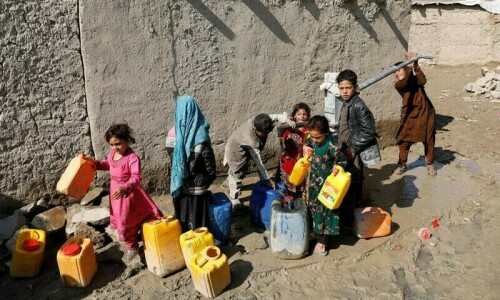KARACHI: Pakistan is losing a major export source by not developing proper handling and processing facilities for tuna, a highly important commercial fish. Also, the country is failing to comply with a major obligation under the Indian Ocean Tuna Commission (IOTC) to which it’s a signatory.
These points were raised on the first day of a three-day workshop titled ‘Data Collection for Tuna Fisheries in the Indian Ocean’ jointly organised by the World Wide Fund for Nature-Pakistan in collaboration with the marine fisheries department and IOTC under its Areas Beyond National Jurisdiction (ABNJ) project at a local hotel.
Established in 1996, the IOTC is an intergovernmental organisation that coordinates the regulation and management of tuna in the Indian Ocean.
Representatives from Kenya, Mozambique, the Maldives, Sri Lanka, Pakistan and Iran made presentations during the event and shared experiences about tuna fisheries in their respective countries.
The experts had consensus over the importance of observer data which, they said, was vital for fisheries management, providing an independent source of detailed and high-quality information on fishing activities and catches.
Effective management of shared tuna stocks in the Indian Ocean, they said, could only be achieved through provision of consistent and robust data for which there was a need to establish and strengthen national observer programmes by regional countries.
In this regard, there was a specific suggestion for use of modern instruments such as vessel monitoring system, electronic logbooks and electronic monitoring systems.
Fabio Fiorellato, the data coordinator at the IOTC secretariat, provided updates on the level of compliance with the IOTC Regional Observer Scheme (ROS).
According to him, details of 375 observers from 15 CPCs (Contracting Parties and Cooperating, non-contracting parties) — as of today — have been provided to the IOTC secretariat in accordance with the ROS requirements and that these do not yet include Pakistani observers as it doesn’t have a scientific national observer programme.
Participants explored alternative protocols to support observer data collection and reporting tools during the workshop. One of them was the crew-based observer scheme being successfully implemented by Pakistan.
Presenting Pakistan’s tuna fisheries’ status, Mohammad Moazzam Khan of WWF-P said that the country had a substantially large tuna fleet catching about 70,000 tonnes of tuna every year.
Of the eight tuna species found in Pakistan, the three dominating ones were yellow fin, skipjack, longtail tuna, which constituted 70 per cent of the tuna landing, he said, adding that kawakawa, frigate tuna, bullet tuna and stripped tuna were other tuna species found in the country’s waters.
On shortcomings in data collection, he said that his organisation had initiated an important crew-based programme whereby information was collected through fishermen. The programme had received international recognition.
“Pakistan can contribute significantly to the national economy by developing proper fish handling and processing facilities and, at the same time, complying with the IOTC requirements,” he observed.
Speakers included director general of conservation and rehabilitation of marine resources, Iran Fisheries Organisation, Dr Reza Shahifar, senior researcher at the Fisheries Research Institute, Mozambique, José Sebastião Halafo, fisheries development commissioner at the Ministry of Maritime Affairs Asad Rafiq Chandna and secretary of Balochistan coastal development and fisheries Arshad Hussain Bugti.
The workshop in the next two days will discuss the feasibility of adopting alternative data collection methods in order to ensure science-based management regime for tuna fisheries of the Indian Ocean countries.
Published in Dawn, December 12th, 2018














































